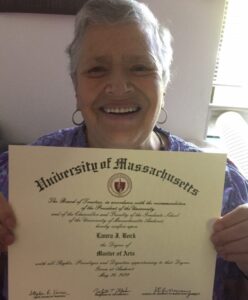Sharing Member Stories: Laura Bock, “Dream Deferred But Not Forgotten”
how to join
Resources
about ccwh
We help women historians thrive through events, resources, and community.
Many thanks to Laura Bock for sharing her remarkable story with us! Want to share your story? Email execdir@theccwh.org or membership@theccwh.org.
A year ago, I stumbled upon two books, which have changed my life. These books are Voices of Women Historians: The Personal, the Political and the Professional by Eileen Boris, and Reshaping Women’s History: Voices of Non-Traditional Women Historians by Barbara Winslow, Julie A. Gallagher, and Nupur Chaudhuri. The latter book, of course, is an anthology by women historians who had won the Catherine Prelinger Award. I researched CCWH, found you, found the description of the award, and began to tremble. I was 77, and it described me!
In the fall of 1970 at the age of 24, I drove from San Francisco to Amherst to begin my graduate studies in the history department at the University of Massachusetts. I ended up loving living in New England including all the snow and even the ice storms, although the summer humidity I could do without! I enjoyed my classes, both fall and spring semesters and did well.
And then suddenly at the beginning of June 1971 I went blind. I was diagnosed with optic neuritis and my parents were told I would not see again. After 6 months back home in San Francisco, learning to be blind out in the world, I returned to UMass. Ultimately, I failed to reach my goal, having none of the skills I needed to be a successful graduate student without eyesight. There were no personal computers or specialized software at the time to assist blind students. I left feeling defeated and ashamed, and remained that way until last fall. Finding the CCWH website, the award, and reading those two books cracked open a very old creaky door, just a bit. My gratitude to CCWH is profound and very personal.
With trepidation I contacted my old department at UMass, and discovered that according to my transcript my three incomplete classes still remained. In January of this year I sent a proposal to the History Department requesting my Masters on the basis of the classwork and orals I had completed 50 years before, along with 5 decades of work taking classes/trainings/doing presentations/publishing my memoir/processing and preserving archival collections, and keeping my “hands in history”.
With little hope, I expected that this large state university would not consider my unconventional request. They did, and on March 3, Women’s History Month, I was notified that the Graduate Committee of the Department would grant me the Masters. The second step was to submit the proposal to the Graduate School as a whole, which concurred with their decision. I received this news with screams, cheers, and disbelief.
I was met with nothing but kindness, interest and support by the Director of History Graduate Students at UMass, Dr. Joel Wolfe, and the Coordinator of History Graduate Students, Mary Lashway. The department had changed in so many ways in the past five decades. In 1970, as I recall, there were no faculty members in American History who were women or people of color, and few other women graduate students. It was a man’s world, and I felt lonely and isolated. Now about half the faculty members are women, and many faculty are people of color. Some of the women faculty are doing work in feminist women’s history and issues of social justice. It’s a different world. Thank goodness!
I now have my diploma hanging on my wall in a prominent position, and I continue doing the work I love. For over 30 years I have been a volunteer archivist for several community archives and libraries, working to sort, preserve and make ready LGBT+ collections for present and future students and researchers. At present I work with Bay Area Lesbian Archives (BALA).
For the last two months I’ve been working to get this story out in the world, hopefully to encourage and inspire other old people who for any number of reasons had their academic dream end prematurely. I want other old women and people of color to know that this can be a viable option no matter how old they are.

November 21, 2023
how to join
Resources
about ccwh
We help women historians thrive through events, resources, and community.
Copyright © 2022 Coordinating Council for Women in History. All Rights Reserved.
Privacy Policy | Terms of Use | site credit